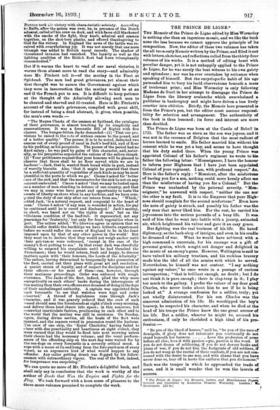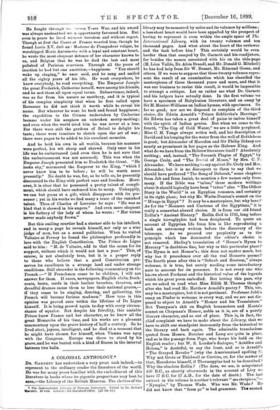THE PRINCE DE LIGNE.*
THE Memoir of the Prince de Ligne editedbyMies Wormeley is nothing else than an ingenious mosaic, and we like the book
none the less because we cannot approve the principle of its composition. Now, the editor of these two volumes has taken the all too scanty Memoir written by the Prince, and filled it out with letters, sketches, and reflections culled from the th irty-fou r volumes of his works. It is a method of editing beset with peculiar danger, yet it is not unhappily applied to the Prince de Ligne, for he was surely the best witness to his own gaiety and splendour ; nor was he ever overtaken by reticence when speaking of himself. But the encyclopmdic habit of his age persuaded him to bury his lucid observations beneath a mass of irrelevant print; and Miss Wormeley is only following Madame de Sta€1 in her attempt to disengage the Prince de
Ligne from the literary avalanche which overwhelmed s publisher in bankruptcy and might have driven a less lively
courtier into oblivion. Briefly, the Memoir here presented is from the Prince's pen, but the editor must assume responsi- bility for selection and arrangement. The authenticity of the book is thus lessened ; its force and interest are more than doubled.
The Prince de Ligne was born at the Castle of Belmil in
1735. The father was as stern as the son was joyous, and it was not in the recesses of Belgium that the most radiant of heroes learned to smile. His father married him without his consent while he was yet a boy, and seems to have thought that his duty ended there. When the young Prince was appointed Colonel of his father's regiment be wrote to his father the following letter: "Monseigneur, I have the honour to inform your Highness that I have just been appointed Colonel of your regiment. I am, with profound respect," dm Here is the father's reply : " Monsieur, after the misfortune of having you for a son, nothing could more keenly affect me than the misfortune of having you for a Colonel." Bat the Prince was unabashed by the paternal severity. "Mon- seigneur," he answered with respect, " neither the one nor the other is my fault. It is to the Emperor that your High- ness should complain for the second misfortune." Even here the note of gaiety is struck, and possibly his father was the only man that never liked him. For the rest, he carried his joyousness into the serious pursuits of a busy life. It was-
said of him that he went into battle with a jaunty, animated air, which heightened his valour and gave it an easy grace.
But fighting was the real business of his life. He hated
diplomacy, as the back-shop of intrigue, and even in his cradle he dreamed of war. What he would have achieved with a. high command is uncertain, for his courage was a gift of
personal genius, which sought out danger and delighted in the music of an enemy's guns. However, Wellington is said to have valued his military treatises, and his reckless bravery made him the idol of all the armies with which he served. Nevertheless, he himself was not content. "I say nothing against my valour," he once wrote in a passage of curious introspection; " that is brilliant enough, no doubt ; but I do not think it is pure enough ; there is clap-trap in it ; I play too much to the gallery. I prefer the valour of my dear good
Charles, who never looks about him to see if he is being looked at." A strange confession for a soldier, truly; yet not wholly disinterested. For his son Charles was the sincerest admiration of his life. He worshipped the boy's bravery, he respected his character, and when he died at the head of his troops the Prince knew the one great sorrow of his life. But a soldier, whoever he might be, aroused his enthusiasm, if only he cherished a high ideal of his pro- fession :- " Be you of the blood of heroes," said he, "be you of the race of demigods, if glory does not intoxicate you continually do not stand beneath her banners Love the profession of arms before all else ; love it with passion—yes, passion is the word. If you do not dream of soldiering, if you do not devour books and. plans of war, if you do not kiss the footprints of old soldiers, if you do not weep at the recital of their combats, if you are not con- sumed with the desire to see war, and with shame that you bay. never done so, tear off in haste the uniform that you dis honour."
Such was the temper in which he approached the trade of arms, and it is small wonder that he won the laurels of. success.
• The Prince de Thane: his Memoirs, Letters, and Miscellaneous Paper& Selected and translated by Katharine Prescott Wormeley. London : R. Heincruann. [L2 2s.]
He fought through ..-e-veu Years War, and his sword was always unsheathed wit. n opportunity favoured him. Bat even in peace he lived wit bout boredom and without regret. Though at first the Court of France wearied him, though he found Louis XV. dull an I Madame de Pompadour vulgar, he worshipped Marie Antoinette with a loyal and constant heart, he wrote the most eloquent defence of her character known to us, and Belgian that he was he died the last and most polished of Parisian courtiers. Through all the years of inaction he had but one am bit ion,--happiness. "You should wake up singing," he once said, and he sang and smiled all the eighty years of his life. He went everywhere, he knew everybody, he read everything. The Emperor Joseph, the great Frederick, Catherine herself, were among his friends, and he met them all upon equal terms. Subservience, indeed, was as far from his nature as snobbery, and it is typical of his complex simplicity that when he first called upon Rousseau he did not think it worth while to reveal his name. But wherever he went he took and found happiness ; the expedition to the Crimea undertaken by Catherine became under his auspices an unbroken merry-making ; and even when the world tired him he was never at a loss. For there were still the gardens of Belceil to delight his taste ; there were treatises to sketch upon the art of war ; there were pages to be added to his excellent memoirs.
And he held his own in all worlds, because his manners were perfect, his wit sharp and shrewd. Only once in his life was he embarrassed (and even then he is not sure that the embarrassment was not assumed). This was when the Emperor Joseph presented him to Frederick the Great. "He looks shy," murmured the Emperor to the King, "which I never knew him to be before ; he will be worth more presently." No doubt he was, for, as he tells us, he presently discoursed to the King with perfect ease and freedom. More- over, it is clear that he possessed a pretty talent of compli- ment, which should have endeared him to many. Unhappily, we can but guess at a gift, which disappears with its pos- sessor ; yet in his works we find many a trace of the vanished talent. Thus of Charles of Lorraine he says : "He was so kind that it showed in his angers." And even more eloquent is his flattery of the lady of whom he wrote : " Her virtue never made anybody frown."
But this smiling courtier had a sterner side to his intellect, and in many a page he reveals himself, not only as a wise judge of men, but as a sound politician. When he visited Voltaire at Ferney he found the philosopher profoundly in love with the English Constitution. The Prince de Ligne said to him : " M. de Voltaire, add to that the ocean for its support, without which it would not last a year." This, of course, is not absolutely true, but it is a proper reply to those who believe that a good Constitution pre- serves its excellence in a strange land and under strange conditions. Still shrewder is the following commentary on the French :—" If Frenchmen cease to be children, I will not answer for them. If races, newspapers, English clubs, frock. coats, boots, cords in their leather breeches, theatres, and dreadful dramas cause them to lose their national graces,— if they cease to be singing, dancing, and gallanting, the French will become furious madmen." How true is this opinion was proved once within the lifetime of De Ligne himself. It is being proved again to-day with every circum- stance of squalor. But despite his frivolity, this amiable Prince knew France and her character, as he knew all the great Monarchs of his time, and his works are a pleasant commentary upon the grave history of half a century. So he lived alert, joyous, intelligent, and he died at a moment that be might have chosen for himself, when Vienna was agog with the Congress. Europe was there to stand by his grave, and he was buried with a kind of fitness in the interval between two balls.











































 Previous page
Previous page